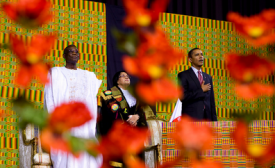new media
An international uproar mounted Tuesday over the fate of hundreds of Nigerian schoolgirls abducted by Islamist militants in mid-April, with the Obama administration preparing to send a team of specialists to Nigeria to help recover the missing girls and U.N. officials warning that the kidnappers could face arrest, prosecution and prison under international law. A social-media campaign called Bring Back Our Girls has gained rapid traction on Facebook and other sites over the past several days.

How does what we know about information and communication technology (ICTs) and persuasion help practitioners makes sense of how to integrate technology into the mission of public diplomacy? We know that ICTs can be:
A) Persuasive by its ability to facilitate or enable other attempts at persuasion.
B) Persuasive as a transmission vehicle (the medium endows some form of credibility or legitimacy).
C) Persuasive as a kind of context for communication - an intermediary - that enables the influence potential of social ties.
How does what we know help practitioners makes sense of how to integrate technology into their mission? We know that information and communication technology can be: A) persuasive by its ability to facilitate or enable other attempts at persuasion, B) persuasive as a transmission vehicle (the medium endows some form of credibility or legitimacy), or C) persuasive as a kind of context for communication, an intermediary, that enables influential power of social ties.

On Sunday, September 22, 2013, al-Shabab, a Somali-based al Qaeda cell unleashed gunfire on a Kenyan shopping mall, murdering 72 people and injuring over 200 others. The deadliest terrorist attack in Kenya since the 1998 bombing of the U.S. Embassy in Nairobi, the Kenyan mall shooting temporarily brought Africa to the forefront of U.S. news organizations like CNN, MSNBC, and Fox, who typically ignore the continent.
On Sunday, September 22, 2013, al-Shabab, a Somali-based al Qaeda cell unleashed gunfire on a Kenyan shopping mall, murdering 72 people and injuring over 200 others. The deadliest terrorist attack in Kenya since the 1998 bombing of the U.S. Embassy in Nairobi, the Kenyan mall shooting temporarily brought Africa to the forefront of U.S. news organizations like CNN, MSNBC, and Fox, who typically ignore the continent.
As an indication of how online media are becoming ever more dominant in our world, consider two newspaper front pages (the ink-on-paper versions) on Wednesday, April 24.
An increasing number of policymakers and think-tank residents are championing the power of social media and big data to pressure governments, empower civil society, deter human rights abuses, and semi-accurately forecast political instability and conflict. In a column today, Thomas Friedman endorsed utilizing existing social networks “to our advantage to gain leverage in diplomacy” by speaking directly to Iranians, Israelis, and Palestinians.







